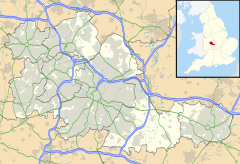Acocks Green
| Acocks Green | |
|---|---|
 Broad Road, Acocks Green |
|
| Acocks Green shown within the West Midlands | |
| Area | 4.773 km2 (1.843 sq mi) |
| Population | 28,378 (2011 Population Census) |
| • Density | 5,580 per km² |
| OS grid reference | SP118833 |
| Metropolitan borough | |
| Metropolitan county | |
| Region | |
| Country | England |
| Sovereign state | United Kingdom |
| Post town | BIRMINGHAM |
| Postcode district | B27 |
| Dialling code | 0121 |
| Police | West Midlands |
| Fire | West Midlands |
| Ambulance | West Midlands |
| EU Parliament | West Midlands |
| UK Parliament | |
Acocks Green is an area and ward of south Birmingham, England. It is named after the Acock family who built a large house in the area in 1370. Acocks Green is one of the four wards making up Yardley formal district. The place name is occasionally spelled "Acock's Green" with an apostrophe, although nowadays "Acocks Green" is more usual. It has frequently been noted on lists of unusual place names.
Stockfield, located in the north of the ward, was once a separate village to the Acocks Green area. However, the two merged as a result of housing developments during the 20th century. The ward now covers an area 4.773 square kilometres (2 sq mi). Areas covered by the ward include the Edenbridge Road Estate, Gospel Estate, Pemberley Road Flats, Stockfield Estate, part of the Tyseley Estate and the Yarnfield Estate. The ward covers part of the B27 and part of the B11 postcode areas.
Acocks Green first developed north of the current centre at the roundabout where the Warwick Road meets Shirley and Westley Roads. This area was known Tenchlee or Tenelea, meaning 'ten clearings'. The settlement that developed here has completely disappeared. Hyron Hall and Broom Hall were moated manor houses located in the area. The area of Fox Hollies in the ward receives its name from the time when the Fox family bought the farm belonging to the atte Holies in the 15th century. The earliest known reference to Acocks Green is in the Yardley Parish Register of 1604. In 1626, Acocks Green House and other estates were given by Richard Acock to his son as a wedding gift. In 1725, the Warwick Road was turnpiked. During the end of the 18th century, the Warwick and Birmingham Canal was cut through Acocks' Green. This resulted in wharfs being constructed at Stockfield Road and Yardley Road. The increased prosperity brought by the canal prompted the construction of farms and large residences.
Acocks Green began to expand in the 19th century when it was connected to the Birmingham to Oxford railway in 1852. At this time there were three hamlets along the Warwick Road; Flint Green, Acocks Green, and Westley Brook. Westley Brook was to become the centre of modern Acocks Green. As Acocks Green was closer to the station, it developed faster than the old centre.
...
Wikipedia

